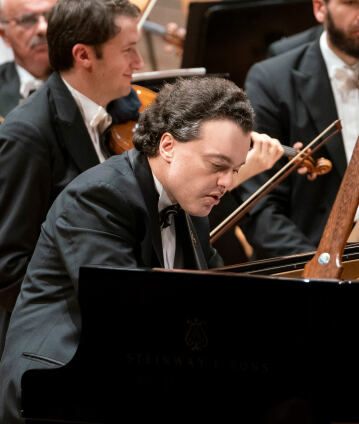Mariss Jansons y Yevgueni Kissin

Este concierto con Mariss Jansons es, en cierto sentido, una reunión familiar posromántica: se ofrecerá la obertura de Rienzi de Richard Wagner junto con el triunfal Primer Concierto para piano de su suegro, Franz Liszt. Su “descendiente” musical, Richard Strauss, por su parte, perfeccionó el poema sinfónico desarrollado originalmente por Liszt, como el famoso Así habló Zaratustra, que se interpreta también en este concierto. El solista de la velada es Yevgueni Kissin, uno de los grandes pianistas de nuestro tiempo.
At the age of two, Evgeny Kissin began to play pieces on the piano by ear and to improvise. When he was ten, he made his concert debut with Mozart’s Piano Concerto in D minor K. 466, followed by his first solo recital a year later. In 1988, the Moscow-born pianist was invited to play before Herbert von Karajan who spontaneously engaged the then 17-year-old for the Berliner Philharmoniker’s New Year’s Eve Concert. Today, Evgeny Kissin can look back on a long and fulfilling career. Mariss Jansons, who the Berliner Philharmoniker made an honorary member in January 2018, conducts these three evenings in which Kissin is the soloist in Franz Liszt’s heroic and brilliant Piano Concerto in E flat major which leads its listeners into a veritable labyrinth of interconnected movements and circulating themes. Liszt took Schubert’s Wanderer-Fantasie as a model, which can either be understood as a free-form sonata main movement or as a complete sonata cycle – including an adagio, scherzo and a superlative finale.
Before the Piano Concerto, which is counted as No. 1 in Liszt’s oeuvre since it was published and premiered first, we hear Richard Strauss’s tone poem Also sprach Zarathustra. The young Strauss declared his aim was not to write “philosophical music” or to attempt to “represent Nietzsche’s great work musically”, rather, the composer was fascinated by Nietzsche’s fundamental social criticism and the Dionysian approach to life which is expressed in the book. The outlandish theory of the “superhuman” is transformed in Strauss’s interpretation into a reflection on the natural powers of man, with whose help he can take up the fight against mediocrity and backwardness. After the Berlin premiere of this work on 30 November 1896, performed by the Berliner Philharmoniker under the baton of Arthur Nikisch only three days after the Frankfurt premiere, Otto Lessmann described the work as a “landmark in the field of pure instrumental music” in the Allgemeine Musikzeitung. His conclusion: “To even attempt to give a picture of the magnificence of the musical conception of this work in a concert report would be a futile effort.”
The concert closes with Richard Wagner’s captivating Rienzi overture which features a thematic potpourri of the battle cry (“Santo Spirito cavaliere”) and triumphal march (“Ertönet laut, ihr Freudenlieder”) from the third act of the opera.
© 2019 Berlin Phil Media GmbH
Entrevistas del concierto
Artistas
Nuestras recomendaciones
- Herbert von Karajan y Yevgueni Kissin en el Concierto de Nochevieja de 1988
- Fabio Luisi y Yevgueni Kissin
- Concierto de Nochevieja de 2011 con Simon Rattle y Yevgueni Kissin
- Claudio Abbado dirige una Gala Beethoven en el Concierto de Nochevieja de 1991
- Mariss Jansons y Daniil Trifonov con el Concierto para piano de Schumann
- Mariss Jansons dirige la Sinfonía «Del Nuevo Mundo» de Dvořák